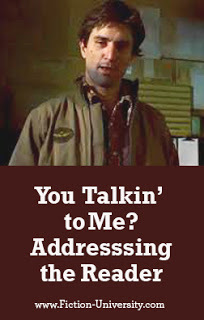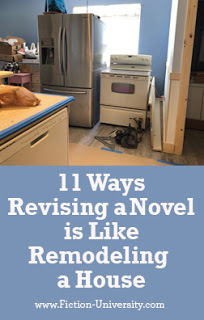Janice Hardy's Blog, page 109
April 19, 2018
Easy Ways to Sell Signed Copies of Your Novel Online
 By J. Kathleen Cheney, @jkcheney
By J. Kathleen Cheney, @jkcheney Part of the Indie Authors Series
I’ve been in this author game for a while, and it still surprises me when someone wants a signed copy of one of my books.
Signings, both at conventions and at bookstores, are often fraught things, with no one showing up at one signing when the next week twenty people stand at your table. For some of us writers, those public appearances are quite stressful. And while there are those among us who are even brave enough to rent a table at a convention and sell from there, I haven’t had the nerve to join those ranks yet. (Jaimie Engle talks about selling at an event here.)
As it is, I’m doing only a few appearances a year, so I can’t get very many signed copies out there anyway. And what about that nice person who can’t get to your signing?
Read more »Written by Janice Hardy. Fiction-University.com

Published on April 19, 2018 03:00
April 18, 2018
5 Ways to Structure (and Plot) Your Novel
 By Janice Hardy, @Janice_Hardy
By Janice Hardy, @Janice_Hardy Writing is a creative process with a lot of variables, but basic story structure is consistent and reliable. Hit these points at roughly these times and you will finish a complete story arc and novel.
Note I said “complete” and not “good.” We all know there’s so much more to writing than putting the right pieces in the right places, but solid story structure is the first step to creating a solid story. Plenty of well-written novels with good ideas have stumbled and failed because they had flawed structure, and that hurt the overall story.
Think about a movie you’ve seen that should have been great, but wasn’t, because:
It felt unevenly pacedIt didn’t take advantage of the cool things it setupIt felt like it was missing important momentsIt was predictableRead more »Written by Janice Hardy. Fiction-University.com

Published on April 18, 2018 05:46
April 17, 2018
10 Best Packing Tips For Authors
 By Gail Carriger, @gailcarriger
By Gail Carriger, @gailcarriger Part of the How They Do It Series
JH: Whether you're published (yet) or not, odds are you'll attend a writing event at some point in your writing journey. For those requiring overnight stays, some special packing just might be in order. Gail Carriger returns to the lecture hall today, to share her tips on packing well for a writers' event.
Gail Carriger writes comedies of manners mixed with paranormal romance (and the sexy San Andreas Shifter series as G.L. Carriger). Her steampunk books include the Parasol Protectorate, Custard Protocol, Supernatural Society, and Delightfully Deadly series for adults, and the Finishing School series for young adults. She is published in many languages and has over a dozen NYT bestsellers. She was once an archaeologist and is fond of shoes, octopuses, and tea.
Website | Facebook | Twitter | Goodreads | Tumblr
Take it away Gail...
Read more »Written by Janice Hardy. Fiction-University.com

Published on April 17, 2018 03:00
April 16, 2018
The Easiest Way to Get More Writing Done
 By Janice Hardy, @Janice_Hardy
By Janice Hardy, @Janice_Hardy I’m always looking for ways to be more productive (and organized, which for me, is a lot harder), so I’ll try just about anything that sounds interesting. But what has worked better than anything else I’ve ever done, is something anyone can do.
Turn off my email when I sit down to write.
Turning off my wifi is even better.
When I have no distractions, I get more writing done. But when email is sitting there with its little Inbox (13) staring at me from the bottom of my screen, it’s hard not to click over “just to check.” Especially when I hit a point in my scene where I’m not sure what the next sentence is. Instead of focusing and getting past it, I’m wasting time looking at an email I don’t need to worry about right now.
Read more »Written by Janice Hardy. Fiction-University.com

Published on April 16, 2018 03:00
April 15, 2018
Writing Prompt: The Story Starter: A Difficult Situation
 By Janice Hardy, @Janice_Hardy
By Janice Hardy, @Janice_HardyThis week’s prompt is a story starter, so take the element provided and turn it into a story of any length you choose. If you’re stuck on size, I suggest aiming for 1000-2000 words.
Your protagonist just learned someone they trust betrayed them. While they’re trying to process it, that person calls needing their help.
Fill this situation out with whatever details you want, as long as you use this core problem. Written by Janice Hardy. Fiction-University.com

Published on April 15, 2018 03:00
April 14, 2018
Real Life Diagnostics: Is This an Engaging Science Fiction Opening?
 Critique By Janice Hardy, @Janice_Hardy
Critique By Janice Hardy, @Janice_HardyReal Life Diagnostics is a weekly column that studies a snippet of a work in progress for specific issues. Readers are encouraged to send in work with questions, and we diagnose it on the site. It’s part critique, part example, and designed to help the submitter as well as anyone else having a similar problem.
If you're interested in submitting to Real Life Diagnostics, please check out these guidelines.
Submissions currently in the queue: Two
Please Note: As of today, RLD slots are booked through April 28.
This week’s questions:
Is this an engaging opening? I wanted to introduce life in 2090, but do I have too many specialized terms?
Market/Genre: Women's Fiction- Sci Fi
On to the diagnosis…
Original text:
Background: The excerpt I am sending you is set in the the year 2090. Life in 2090 is energetic and optimistic as the past decades have brought wealth and peace to all on Earth, thanks to countries uniting to develop, commerce, technology, science, and space exploration. But, Charli is overwhelmed by a world filled with tech and adventure. Her husband is in poor health (accident while golfing in space), her young adult children are on scientific missions to near- Mars, and her sister's Zizi's husband, Hyperion Jones, has disappeared while on an asteroid mining project. However, Charli still possesses a speck of the humor and positive attitude that inspired her great-grandmother Charli. Can Charli press on and prevail in 2090?
"Oh, geez. It's a holiday and it's raining and storming?" Zizi sloshed her coffee as she sat down by her sister Charli on the loveseat on the balcony. She eCommed wipe up spill and the mini house robot glided to clean it up. Flash! Blue-white lightening shards shot from furious black thunderhead clouds. Zizi flinched and more coffee dribbled on her robe.
Zizi eCommed the heat setting on her cushion to high and she made a point to cross and uncross her legs, cough and then pat Charli on her shoulder. Charli looked straight out the window and didn't say anything.
Zizi tried again. "Happy Thanksgiving, honey. I was hoping we could enjoy our feast today on the outside SkyFloat. But this downpour looks like it will never stop." Why was Charli tapping her forehead over and over?
"Uh, Charli sweetie, you keep tapping. Do you need a robot? Can I get you something? Oh, are you getting important news?" Zizi would have said more but Charli shut her eyes and covered her ears. Zizi had had enough.
"Not again!" Zizi jumped up and was ready to sputter more at Charli, but then she gulped and stopped. She took a calming breath. "It's not really raining today, is it Charli?" Zizi thought-pulsed the VR Menu for the window. "You set the VR on Thunderstorm didn't you?" She bit back the word, "again".
Zizi pulsed through the various window view settings. "Let's set it for reality." The floor stopped the kinetic thunder rumble vibration and the scene out the window blinked and changed to blue sky, with sun sparkling on the waves of Great Lake Iris. Sea gulls rode the wind currents and cooed.
Zizi leaned closer and hugged her sister's shoulder. "I get that you feel dark and miserable on the inside, but it might help to let in some light. Let's plan our day. I know, we need our holiday breakfast." Zizi eCommed coffee carafe and cinnamon rolls.
My Thoughts in Purple:
"Oh, [geez] slang is hard to get right, but perhaps create something that sounds more futuristic and not so modern?. It's [a holiday] later she says Thanksgiving, so why not call it that here? and it's raining and storming?" Zizi sloshed her coffee as she sat down by her sister Charli on the loveseat on the balcony. [She eCommed wipe up spill] perhaps do something to set apart “wipe up spill” so it’s clear it’s a command? I stumbled over it on the first read and the [mini] this suggests there’s a larger version house robot glided to clean it up. [Flash! Blue-white lightening shards shot from furious black thunderhead clouds.] This reads as if the robot did this to clean the spill, but I think it’s the storm Zizi flinched and [more coffee dribbled on her robe] so she spilled coffee on her robe the first time as well? The “more coffee” suggests that, but I don’t think that’s actually the case or she wouldn’t have called the robot.
Zizi [eCommed the heat setting on her cushion to high] she uses this twice in a row, which feels a little forced and she made a point to cross and uncross her legs, cough and then [pat Charli on her shoulder.] A little internalization here would be nice to know why. It seems like she’s trying to get her attention, but later, it’s more like she’s offering comfort Charli looked straight out the window and didn't say anything.
Zizi tried again. "Happy Thanksgiving, honey. I was hoping we could enjoy our feast today on the [outside SkyFloat.] Outside suggests there’s an inside SkyFloat, but I suspect there isn’t. But I don’t know what this is either way But this downpour looks like it will never stop." [Why was Charli tapping her forehead over and over?] This seems odd since we don’t see Charli do this, even though her sister’s been staring at her
["Uh, Charli sweetie, you keep tapping.] This is a repeat of what she just thought [Do you need a robot?] I don’t understand how this helps, so the detail doesn’t add anything to the scene Can I get you something? [Oh, are you getting important news?"] This is interesting as it suggests some type of cyber implant or something, but there’s nothing to clarify what this means Zizi would have said more but Charli shut her eyes and covered her ears. [Zizi had had enough.] This is odd since this thought fits well with Charli’s action, so it’s almost seems like it’s the wrong character doing it.
"Not again!" Zizi jumped up and was ready to sputter more at Charli, but then [she gulped] gulped typically suggest fear, not holding back anger and stopped. She took a calming breath. "It's not really raining today, is it Charli?" Zizi thought-pulsed the VR Menu [for the window.] this struck me as odd since they were on the balcony, so I assumed it was outside. But this suggests they’re inside with a window "You set the [VR] perhaps say window since that’s how she thinks of it next on Thunderstorm didn't you?" She bit back the word, "again".
Zizi pulsed through the various window view settings. "Let's [set it for reality.] wouldn’t that be turning it off?" The floor stopped the kinetic thunder rumble vibration and the scene out the window blinked and changed to blue sky, with sun sparkling on the waves of Great Lake Iris. Sea gulls rode the wind currents and cooed.
Zizi leaned closer and [hugged her sister's shoulder.] I know what you mean here, but the wording makes it sound as though she’s hugging one shoulder, which is an odd image "I get that you feel dark and miserable on the inside, but it might help to let in some light. Let's plan our day. I know, we need our holiday breakfast." Zizi [eCommed] this is used three times, but I’m not actually sure what it does coffee carafe and cinnamon rolls.
The questions:
1. Is this an engaging opening?
Not yet (readers chime in). I feel a bit detached from it, since there’s little internal thought and a far narrative distance. The names are used too often, which also adds to the distant feeling. I’m not getting a sense of a character with a problem, even though Zizi is worried about Charli. Charli sits there and does nothing, so she’s not feeling in the scene yet, and Zizi feels a bit flat.
(Here’s more on narrative distance)
I’d suggest adding more internal thought and narrative to flesh out the scene a but more. You might also look for ways to get Charli more into it, even if all she does is shift and show through body language that she’s unhappy and doesn’t want to talk. Right now, she’s a blank slate and adds nothing to the scene. It might also help to better show the goal and conflict, as I’m not sure whats driving this scene just yet. There are hints of a problem with Charli seeming depressed, but there’s nothing that pulls me in yet to find out why and what’s wrong.
(Here’s more on internalization)
2. I wanted to introduce life in 2090, but do I have too many specialized terms?
The world doesn’t feel futuristic to me yet. It’s basically a scene we’d have today, just with “future tech” in it. Which isn’t necessarily bad to show life is “the same” but 70 years from now, but if the goal is to show what’s changed it’s not quite doing enough yet.
I don’t think you have too many specialized terms, but you’re using the same one too much, and it’s never made clear what it means. She eComms multiple things and they all have separate functions. She calls the robot to clean up the spill, she adjusts the temperature on her chair, and she orders food, but I’m not sure how those things relate, so it seems like it does whatever is needed at the time. But she also thought-pulses at the VR stuff, which feels different. Is the eComm like a phone or a remote she uses to access tech? Why can’t she adjust the window VR with it?
(Here's more on backgrounding your world through point of view)
What does eComm short for? Because I’d guess electronic communication, which isn’t that different from making a call now. “E” is also commonly used to mean “internet” or “online” in some way in our modern world, so it naturally makes me think along those lines. Terms grow from how people use them, but I don’t see how this became the verb we use versus “she called” or “she texted” or something similar.
It feels like a phone, but called something else. I can adjust my A/C and even connect to my appliances with apps on my phone, so this doesn’t feel out of line, but it doesn’t ring true to me either. If we have implants to thought-pulse, then why isn’t that how we interact with everything? Why eComm the chair when we could just connect and thought-pulse the same application that warms the cushion?
(Here’s more on grounding readers in your world)
Think about how tech is used and what it’s used for. If we do things through implants or thoughts in 2090, that’s how we’d likely interact with most things. Compare it again to the phone. Landlines disappeared when cell phone took over. Streaming has replaced a lot of televisions. I actually have a washer and dryer that has apps for a phone to let me know when cycles are done, and I can start my robot vacuum from an app. That’s not dissimilar to what you’re doing here, but I don’t summon the robot, I turn on the vacuum. It’s the same function, but how we refer to it is different. This feels too much like you’re trying to force “the future.”
But I do like that there’s a device that does things. If there’s a piece of technology that everyone has and uses, people will design things to take advantage of that. So if eComm is just a “future tech” way of saying smart phone, just stick with the phone or something that would naturally develop from what we have now (I just can’t see us using eComm in this way—readers chime in in case it’s just me). It’s been 100 years since the phone was invented and it’s nothing at all like the original, but we still use the same terminology. And if they have implant tech, we’d probably be using that as much as we use our phones today.
Your instincts of having them using the tech to convey it to readers is good though, so I’d suggest fleshing out the problem a bit more and using more futuristic elements to get the setting across better. A little telling in this situation isn’t a bad thing, as readers won’t understand what things are yet. You don’t want to flat out explain them, but a little more would help.
For example, exactly what is she doing when she eComms versus thought pulses? Does she “triggered the implant behind her ear and thought-pulsed the command…” or the like? A few extra words can make a big difference in getting the technology across.
(Here’s more on when telling is better than showing)
I’d suggest coming at this from a slightly different angle. Instead of trying to get the tech in first, focus on the problem and how Zizi is trying to solve it. You’re already heading in that direction with her offering to get a robot and food, so perhaps try fleshing those out a bit more.
For example, maybe Zizi uses her implant to scan through the various types of robots she can get to see what might work for Charli. You can show her using the tech and add some internalization as well. Instead of asking if it’s raining, maybe have her sigh in frustration and check the settings herself. Then she reacts and speaks to Charli about her sulking as she’s changing it or turning it off.
Overall, I think you’re just trying to put too much into a short space so there’s not enough room for everything a good opening needs to do. Slow down a bit, expand on what you have, and look for ways to do both world building and plot at the same time.
Thanks to our brave volunteer for submitting this for me to play with. I hope they–and others–find it helpful. I don’t do a full critique on these, (just as it pertains to the questions) and I encourage you to comment and make suggestions of your own. Just remember that these pieces are works in progress (many by new writers), not polished drafts, so be nice and offer constructive feedback.
About the Critiquer
 Janice Hardy is the award-winning author of the teen fantasy trilogy The Healing Wars, including The Shifter, Blue Fire, and Darkfall from Balzer+Bray/Harper Collins. The Shifter, was chosen for the 2014 list of "Ten Books All Young Georgians Should Read" from the Georgia Center for the Book. It was also shortlisted for the Waterstones Children's Book Prize (2011), and The Truman Award (2011). She also writes the Grace Harper urban fantasy series for adults under the name, J.T. Hardy.
Janice Hardy is the award-winning author of the teen fantasy trilogy The Healing Wars, including The Shifter, Blue Fire, and Darkfall from Balzer+Bray/Harper Collins. The Shifter, was chosen for the 2014 list of "Ten Books All Young Georgians Should Read" from the Georgia Center for the Book. It was also shortlisted for the Waterstones Children's Book Prize (2011), and The Truman Award (2011). She also writes the Grace Harper urban fantasy series for adults under the name, J.T. Hardy.She's the founder of Fiction University and has written multiple books on writing, including Understanding Show, Don't Tell (And Really Getting It), Plotting Your Novel: Ideas and Structure, and the Revising Your Novel: First Draft to Finished Draft series. Website | Facebook | Twitter | Pinterest | Goodreads | Amazon | Barnes & Noble | iTunes | Indie Bound
Written by Janice Hardy. Fiction-University.com

Published on April 14, 2018 05:13
April 13, 2018
Are You Talking to Me? Addressing the Reader
 By Janice Hardy, @Janice_Hardy
By Janice Hardy, @Janice_Hardy This week's Refresher Friday tales an updated look at addressing the reader. Enjoy!
In most stories the narrator is telling the story to an ambiguous “someone.” The fourth wall (the reader) is never broken and everything happens as if no one was watching, just like TV.
But sometimes narrators break that wall and speak directly to the reader. Done well, it can make the reader feel as if they’re listening to a story by a good friend. Done poorly, it jars the reader out of the story and reminds them they’re reading a story.
When you think about it, all first person stories are talking to the reader. The narrator is saying “I did this I did that,” so sometimes you can have sentences that feel like the narrator is addressing the reader when they’re actually not. The comments are more like rhetorical questions or musing to oneself.
It wasn’t like they’d shoot me for it, right?This is fairly common in first person, so it’s not technically speaking directly to the reader. The "right?" could just as easily be the narrator trying to reassure themselves.
Read more »Written by Janice Hardy. Fiction-University.com

Published on April 13, 2018 03:00
April 12, 2018
Solo vs. Group Effort: the Indie Author Collective
 By Dario Ciriello
By Dario CirielloPart of the Indie Authors series
“There is only one thing worse than fighting with allies, and that is fighting without them.”
― Winston Churchill
A little over a year ago, after a decade of writing and publishing as an indie, a local library event brought me into contact with three other L.A. area indie authors.
The personal chemistry felt good and all of us were writing at a pro level. Most importantly, each of us brought different and complimentary sets of skills to the table—graphic design, video trailer production, print formatting skills, copyediting, proofreading, and that rarest of indie author talents, marketing.
Read more »Written by Janice Hardy. Fiction-University.com

Published on April 12, 2018 04:26
April 11, 2018
11 Ways Revising a Novel is Like Remodeling a House
 By Janice Hardy, @Janice_Hardy
By Janice Hardy, @Janice_Hardy I’ve equated writing a novel to building a house many a time, but I’ve developed a new appreciation for that simile recently. Over the last twelve weeks I’ve been revising a novel while remodeling my house, and I’ve noticed a surprising number of similarities.
1. It takes longer than you expected it to.
You’re optimistic at the start, but little things creep in and aspects of the project take a few days more and before you know it—you’re weeks past your original due date. And then you look back and wonder how you managed to get so far off track. Probably because…
Read more »Written by Janice Hardy. Fiction-University.com

Published on April 11, 2018 04:59
April 10, 2018
7 Ways to Master “Show, Don’t Tell”
 By Laurence MacNaughton, @LMacNaughton
By Laurence MacNaughton, @LMacNaughton Part of the How They Do It Series (Contributing Author)
“Show, Don’t Tell” is probably the most often-repeated writing advice in the world. It means that you shouldn't dump a load of information in the middle of the page, because it will stop your story dead. But it's easy to fix that problem, if you know how.
Here are seven different ways that you can unobtrusively slip information (also known as exposition) into your story without raising any red flags. Master these ninja exposition tricks, and you’ll never struggle with “Show, Don’t Tell” again.
Trick #1: Action
The most exciting way to bury exposition is to cover it with action. If your characters are fighting for their lives, ducking for cover, or engaged in a high-speed pursuit, the reader's adrenaline will be pounding. That's the perfect opportunity to slip in your exposition under the radar.
Read more »Written by Janice Hardy. Fiction-University.com

Published on April 10, 2018 05:22



